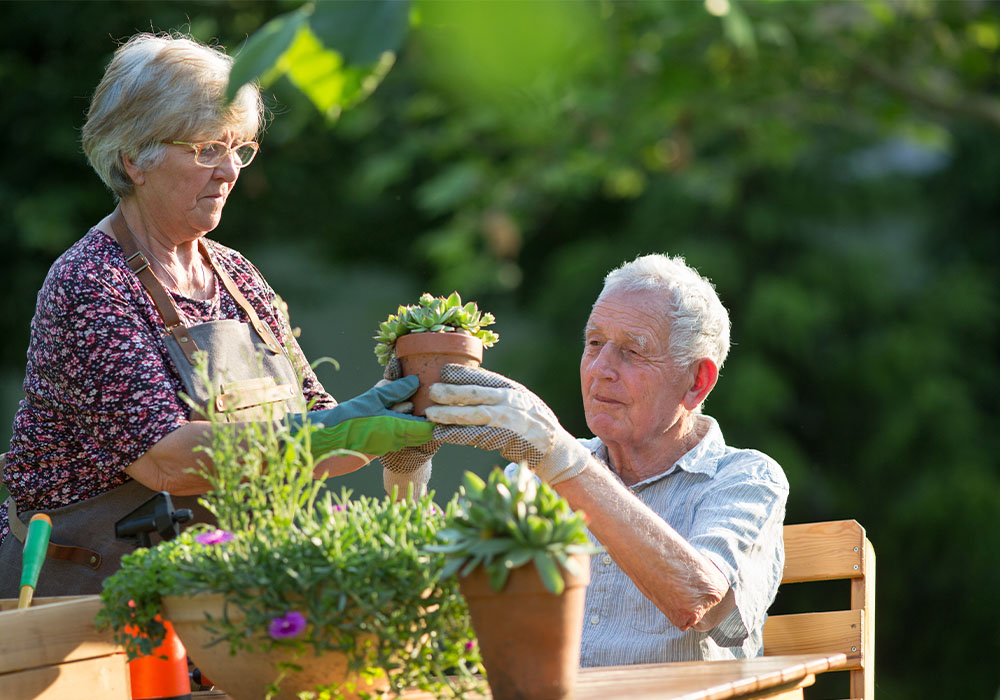There’s something timeless and deeply fulfilling about getting your hands in the soil. For many older adults, gardening is a cherished pastime, but it’s also much more than that. Gardening for seniors offers wide-ranging benefits, from boosting physical activity and mobility to supporting mental clarity and emotional well-being. With a few thoughtful adjustments, this nurturing activity can remain safe and accessible well into the golden years.
At the Caring for Family of Companies, we believe wellness comes in many forms. Gardening is a simple, joyful way for seniors to stay engaged and active—especially with the help of dedicated Caregivers who know how to support each Client’s unique needs.
A Natural Boost for Body and Mind
Spending time in nature has been shown to reduce stress, lower blood pressure, and improve mood. For seniors, gardening creates a direct connection with the outdoors that engages both body and spirit.
Physically, gardening encourages movement that supports flexibility, balance, and strength. Reaching for a watering can, pruning a bush, or gently digging into the soil engages core muscles and supports fine motor skills. Even light gardening can contribute to improved cardiovascular health over time.
Emotionally, tending to plants provides a sense of purpose and accomplishment. Watching something grow—whether it’s a cluster of daisies or a crop of tomatoes—offers a steady, reassuring rhythm. The act of nurturing life can be incredibly grounding, especially during times of change or uncertainty.
How Caregivers Support Gardening for Seniors
For older adults who need extra support, Caregivers play a vital role in making gardening accessible, safe, and enjoyable. This could mean adjusting the layout of a garden space, selecting lightweight tools, or providing a steady arm for balance. Caregivers also offer encouragement and companionship—transforming gardening into a shared, meaningful experience.
Raised beds or vertical planters can bring plants to a comfortable height, reducing the need for kneeling or bending. Using ergonomic tools designed for arthritic hands or limited grip strength makes each task more manageable. Even small container gardens on a patio or balcony can spark joy and engagement without requiring much physical exertion.
With the right adaptations, gardening remains a safe and empowering activity. Caregivers help assess and respond to each Client’s mobility level, creating a custom plan that encourages participation without overexertion.
The Broader Wellness Benefits of Gardening
Gardening doesn’t just promote physical activity; it also supports cognitive and social health. The sensory stimulation of smelling herbs, feeling different textures, and watching colors bloom can awaken memory and attention. For seniors with early-stage dementia or cognitive decline, gardening may provide moments of clarity and connection.
Gardening can also reduce feelings of isolation. Whether sharing the harvest with neighbors or working alongside a Caregiver, the experience fosters connection and a sense of community. It becomes an avenue for conversation, laughter, and storytelling.
Getting Started: Simple Ideas for Every Mobility Level
You don’t need a large backyard to enjoy the benefits of gardening for seniors. Here are a few accessible ways to dig into wellness:
- Tabletop herb gardens indoors or on patios
- Succulent arrangements that require minimal maintenance
- Seasonal container planting with flowers or vegetables
- Bird and butterfly-friendly gardens that add beauty and delight
The key is to meet each senior where they are—physically, emotionally, and spiritually—and make gardening a part of their wellness routine in a safe, supportive way.
Growing With Our Clients
At the Caring for Family of Companies, we’re committed to helping our Clients live active, joyful lives at home. From gardening guidance to everyday care, our Caregivers are here to help nurture the mind, body, and spirit.
Learn more about our in-home services and how we support wellness, season by season.

